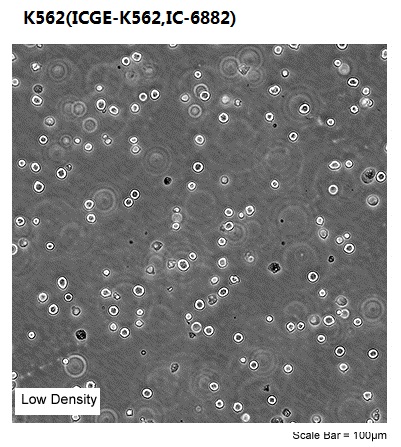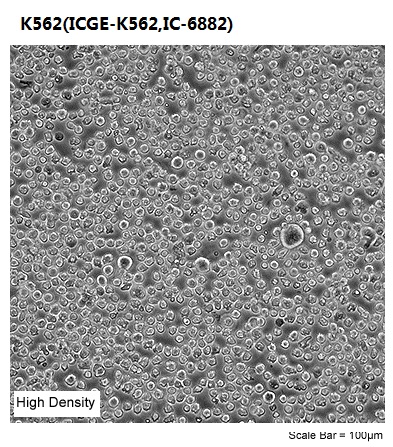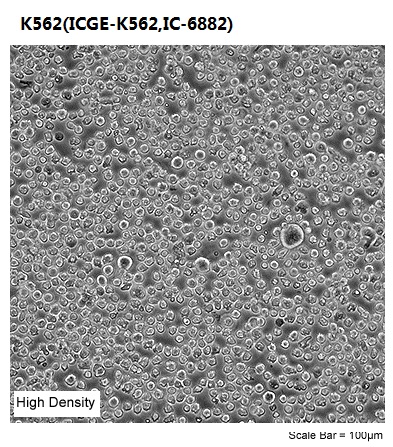


Overview
| Organism | Homo sapiens, human |
|---|---|
| Tissue | bone marrow |
| Product Format | frozen |
| Morphology | lymphoblast |
| Culture Properties | suspension |
| Biosafety Level |
1
Biosafety classification is based on U.S. Public Health Service Guidelines, it is the responsibility of the customer to ensure that their facilities comply with biosafety regulations for their own country. |
| Disease | chronic myelogenous leukemia (CML) |
| Age | 53 years |
| Gender | female |
| Applications |
This cell line is suitable as a transfection host.
The K-562 cell line has attained widespread use as a highly sensitive in vitro target for the natural killer assay. Cultures from the ATCC stock have been shown to exhibit this sensitivity for assessing human natural killer activity.See Pross, et al. for a detailed analysis of the in vitro assay of NK cells including the mathematics of quantitation of NK cell activity. |
| Storage Conditions | liquid nitrogen vapor phase |
Properties
| Karyotype | The stemline chromosome number is triploid with the 2S component occurring at 4.2%. Fifteen markers (M1 and M(15)) occurred in nearly all S metaphases. Spontaneous non-specific dicentrics occurred, but rarely. Unstable markers were also rarely seen. The X was disomic, and N9 was nullisomic. |
|---|---|
|
|
|
| Derivation |
The continuous cell line K-562 was established by Lozzio and Lozzio from the pleural effusion of a 53-year-old female with chronic myelogenous leukemia in terminal blast crises.
|
| Clinical Data |
female
53 years
|
| Antigen Expression | CD7 (25%) |
| Tumorigenic | Yes |
| Effects |
Yes, in nude mice Tumors developed within 21 days at 100% frequency (5/5) in nude mice inoculated subcutaneously with 107 cells |
| Comments |
The cell population has been characterized as highly undifferentiated and of the granulocytic series.
Studies conducted by Anderson, et al., on the surface membrane properties led to the conclusion that the K-562 was a human erythroleukemia line.
K-562 blasts are multipotential, hematopoietic malignant cells that spontaneously differentiate into recognizable progenitors of the erythrocytic, granulocytic and monocytic series.
The effect of inducers on sublines derived from the original K-562 cell line have been reviewed by Koeffler and Golde.
Karyological studies on various K-562 sublines have been classified into three groups (A,B,C) by Dimery, et al.
The strain obtained by the ATCC most closely resembles the B population. Occurrence of the Philadelphia chromosome, however, was of much lower frequency; none detected in 15 metaphases examined. The line is EBNA negative.
|
Background
| Complete Growth Medium |
The base medium for this cell line is ATCC-formulated Iscove''''''''s Modified Dulbecco''''''''s Medium, Catalog No. 30-2005. To make the complete growth medium, add the following components to the base medium: fetal bovine serum to a final concentration of 10%. |
|---|---|
| Subculturing |
Cultures can be maintained by the addition or replacement of fresh medium. Start new cultures at 1 x 105 viable cells/mL. Subculture at 1 x 106 cells/mL. Corning® T-75 flasks (catalog #431464) are recommended for subculturing this product.
Medium Renewal: Every 2 to 3 days
|
| Cryopreservation |
Freeze medium: Complete growth medium supplemented with 5% (v/v) DMSO
Storage temperature: liquid nitrogen vapor phase
|
| Culture Conditions |
Atmosphere: air, 95%; carbon dioxide (CO2), 5%
Temperature: 37��C
|


